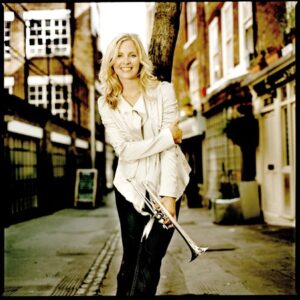In England ist sie längst ein Star: Die 44-jährige Trompeterin Alison Balsom hat bereits zahlreiche Wettbewerbe gewonnen. Unter anderem wurde ihr 2007 der deutsche Musikpreis Echo Klassik für die „Nachwuchskünstlerin des Jahres“ verliehen. Wer sie noch nicht kennt, sollte schleunigst in ihre CDs reinhören. Ohren auf – es lohnt sich!

- Which part of your work made you feel happy today?
Listening to a recording of two concerts I did last week to decide which one to broadcast. I felt I was back there making this great music.
Which goals do you have in life?
To be happy. To add something.
Which profession did you find the most exciting when you were a child?
Trumpet soloist / powerboat racer.
What did you, at the age of twenty, think you would be doing today?
Hoping it would be exactly what I am doing.
In what way has the world changed for you since that time (the age of 20)?
I have more experience now, which has allowed me to enjoy the moment more.
What has accelerated your career most?
Joining the Young Concert Artists Trust the month I graduated.
How much (in percent) of your success do you think you owe to „hard work“ – and how much to „good luck/ coincidence“?
Is it bad to say I think its usually the hard work (plus other things) much more than luck? I don’t believe that one piece of luck helps you or doesn’t help you – if you can do it, you will find a way.
(ok – Good luck that I didn’t get my teeth knocked out on many sailing expeditions)
What part of your job gives you most energy and power?
Being a soloist on stage is all about energy and power. What is great is to add other more subtle things to that, too.
What was the biggest mistake you have made in your professional life?
Not being able to enjoy the journey as I was so scared of not pleasing all of the people all of the time.
What does it mean to you to fail?
It’s painful, but one must remember that it is this that teaches you more than success.
What are you proud of in your profession?
The amazing standards being reached on a daily basis around the world in this most elusive art form against all odds, and funding cuts.
In what way did your studies help your career?
In every way.
What drives you to despair?
In my work – People playing music like they are at an office job they hate.
What do you think of the universities at which you were studying?
Wonderful.
How do you think would your colleagues describe you in your absence?
I don’t have any direct colleagues – I’m a soloist! But those who I work with probably find me unorganised, over or under enthusiastic depending on my mood, impulsive, and hopefully fun sometimes!
Do you have any role models – and if so, what is it you have learnt from them?
Many artists in all walks of life. How to do it and mean it.
What do you value in colleagues in general?
Don’t really have any! But again I value professionalism, common sense, a genuine passion for the work, generosity of spirit.
How do you combine your private and your professional life?
I try to blur the edges as much as possible, which is fine if you love what you do.
Where would you like to be working?
Anywhere that doesn’t mean going to an airport for a week.
If you had to give an advice to our readers – what would it be?
Smell the flowers along the way.
Please finish the following sentence: „Far more important than my career is …“
my loved ones. Health and happiness.
